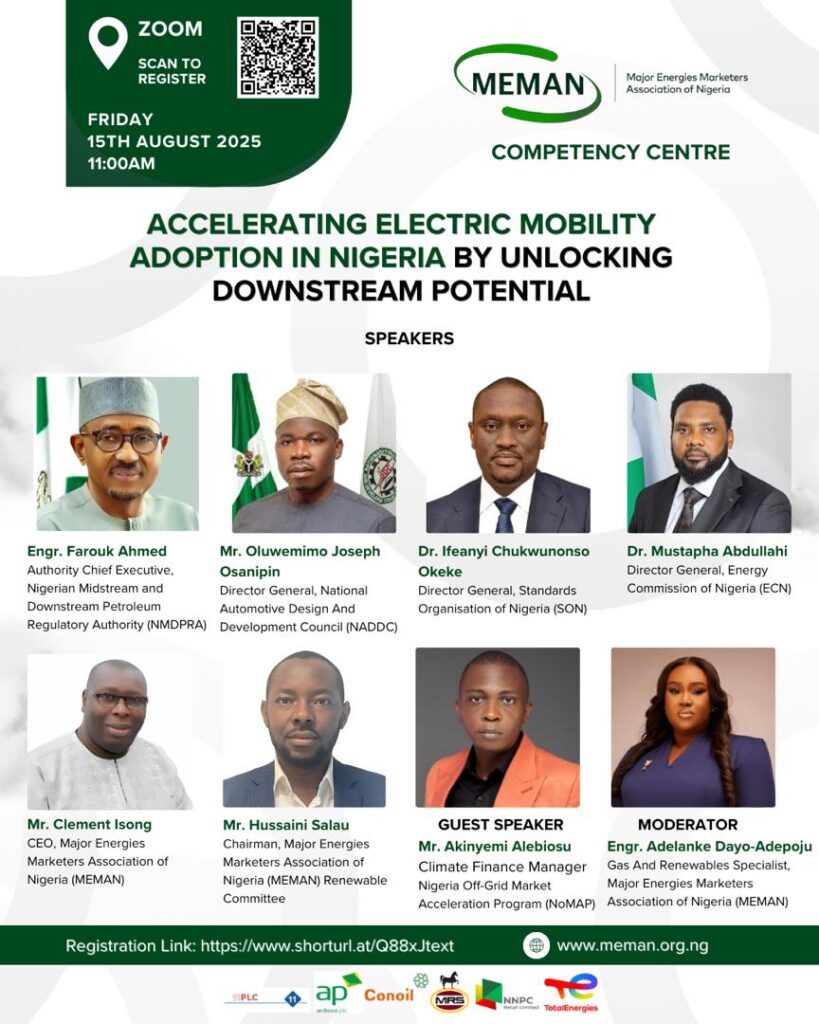
Introduction
The conversation around Nigeria’s energy future is shifting, and electric mobility is at its core. The recent webinar hosted by the Major Energies Marketers Association of Nigeria (MEMAN), titled “Accelerating Electric Mobility Adoption in Nigeria by Unlocking Downstream Potential,” brought together a formidable group of stakeholders to discuss this critical transition. AaraGO was honoured to participate, with our Operations Manager, Mariam Abudu, sharing our unique approach to e-mobility as a panelist.
The Urgency of the Transition
The webinar’s highlights underscored a clear message: the time for electric mobility in Nigeria is now. With the transportation sector accounting for nearly 28% of the country’s greenhouse gas emissions and citizens facing the financial strain of volatile fuel prices, the move to Electric Vehicles (EVs) is a strategic imperative. The discussions explored how existing infrastructures like the vast network of fuel retail stations can be repurposed to serve as EV charging hubs, supported by mini-grids to ensure reliability.
AaraGO’s Innovative Solution
The Battery-Swap Model: During the panel discussion, Mariam presented AaraGO’s groundbreaking work in the two-wheeler sector. This market is a vital entry point for mass EV adoption in Nigeria, and AaraGO has developed a solution that directly addresses the challenges faced by this sector:
- Solar-Powered Battery Swapping: AaraGO’s model is built around convenience and efficiency. Instead of waiting for a battery to charge, our riders can simply swap out a depleted battery for a fully charged one within a minute. This eliminates range anxiety and keeps commercial operators on the move, a crucial factor for last-mile delivery services.
- Sustainable Lifecycle Management: Our commitment to sustainability extends beyond just the initial use. Mariam explained our innovative lifecycle management process, where older batteries are repurposed for use in mini-grids to power homes and businesses, extending their utility and contributing to the circular economy before they are ultimately recycled.
Key Themes from the Webinar
The webinar reinforced several points that resonate deeply with AaraGO’s mission:
- Collaboration is Key: As noted by MEMAN’s leadership, the transition requires a coordinated effort. Regulators, private sector innovators, financiers, and consumers must work together to build a robust ecosystem.
- Standards for Safety and Confidence: The Standards Organisation of Nigeria (SON) emphasized the need for standardized technology to ensure consumer safety and build market trust. AaraGO is a strong proponent of this, as our battery technology and swapping stations are designed with safety and compatibility as a top priority.
- Demand-Driven Strategy: The National Automotive Design and Development Council (NADDC) highlighted the importance of a demand-driven approach. AaraGO’s focus on the two-wheeler market taps into an existing, high-demand sector, ensuring our solution is not just technologically sound but also commercially viable.
- Blended Finance and Innovation: The discussion on financing models, from hire-purchase to leasing, underlined the need for creative solutions to make EVs affordable. AaraGO’s “battery-as-a-service” model is a perfect example of this, reducing the high upfront cost for our customers.
Conclusion
The MEMAN webinar was a pivotal moment, highlighting the collective drive to transform Nigeria’s transportation landscape. AaraGO’s participation and insights into the solar-powered battery-swap model demonstrate our commitment to this vision. We are building an ecosystem that is clean, efficient, and sustainable from start to finish and we look forward to continued collaboration with industry leaders to accelerate Nigeria’s journey toward a brighter, greener future.
